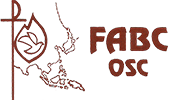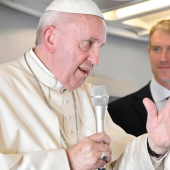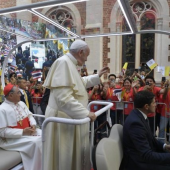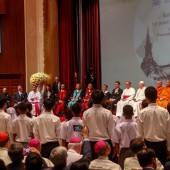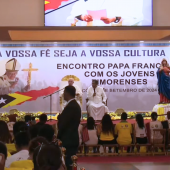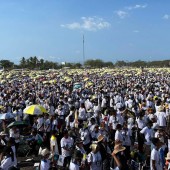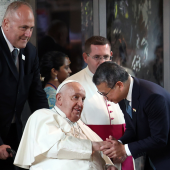Pope Francis focused on Asia’s migration crisis on Nov 21 as he made his first public speech on his seven-day visit to Thailand and Japan.
After being given an official welcome at Government House in Bangkok and meeting Prime Minister Prayut Chan-o-cha, he addressed civil and religious leaders and members of the diplomatic corps.
The pope called migration “one of the defining signs of our time” and “one of the principal moral issues facing our generation.”
He said he hopes “the international community will act with responsibility and foresight to resolve the issues that have led to this tragic exodus and will promote safe, orderly and regulated migration.”
"The crisis of migration cannot be ignored," the pope said. "Thailand itself, known for the welcome it has given to migrants and refugees, has experienced this crisis as a result of the tragic flight of refugees from nearby countries."
According to the 2019 report of the UN working group on migration in Thailand, of the 69 million people living in Thailand, 4.9 million are non-Thais, an increase of 1.2 million in five years. The largest groups come from Cambodia, Laos, Myanmar and Vietnam.
Thailand has about 93,000 refugees living in nine camps. Most are ethnic minorities from Myanmar. Bangladesh is accommodating more than one million Rohingya Muslim refugees from Myanmar.
Pope Francis described Thailand as “the guardian of age-old spiritual and cultural traditions,” a multiethnic and diverse nation that has “long known the importance of building harmony and peaceful coexistence between its numerous ethnic groups.”
Human trafficking, especially of women and children for prostitution and for domestic service, is a major problem in Thailand, according to the UN Action for Cooperation Against Trafficking in Persons.
"Thailand is recognized as a key destination for human trafficking in the Mekong region in addition to being a source and transit country for forced labor and sex trafficking," the UN said. The problem involves poor Thais as well as migrants.
Thailand is recognized as a key destination for human trafficking in the Mekong region in addition to being a source and transit country for forced labor and sex trafficking
Addressing Thai leaders, Pope Francis drew special attention to women and children "who are wounded, violated and exposed to every form of exploitation, enslavement, violence and abuse."
He praised the Thai government’s efforts “to extirpate this scourge” and “for those working to uproot this evil.”
“The future of our peoples is linked in large measure to the way we will ensure a dignified future for our children,” he said.
Pope Francis also looked briefly at the political situation in Thailand, congratulating the country for holding a general election in March for the first time since the military coup in 2014 that installed Prayut as prime minister. After no party or coalition of parties was able to form a government, the parliament voted for the general to continue in office.
But, mostly, the pope focused on Thailand as a country of ethnic, cultural and religious diversity, although about 90 percent of the population is Buddhist.
"Our age is marked by a globalization that is all too often viewed in narrowly economic terms, tending to erase the distinguishing features that shape the beauty and soul of our peoples," he said. "Yet the experience of a unity that respects and makes room for diversity serves as an inspiration and incentive for all those concerned about the kind of world we wish to leave to our children."
The pope confirmed the commitment of Thailand’s “small but vibrant Catholic community” to confront “all that would lead us to be insensitive to the cry of our many brothers and sisters who yearn to be freed from the yoke of poverty, violence and injustice.”
Pope Francis said the name Thailand literally means “Land of the Free,” adding that freedom is possible “only if we are capable of feeling co-responsible for one another and of eliminating every form of inequality.”
He said it is vital to ensure that individuals and communities can have access to education, dignified labor and health care to attain the “minimal levels of sustainability that can enable an integral human development."
Source: Ucanews

